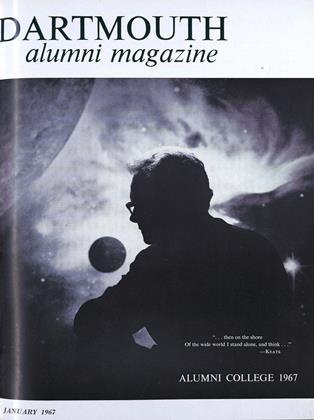DR. HILDRUS A. POINDEXTER '27M is one of those rare men who feel acutely that a special intellect or talent, and in his case specialized knowledge, carries with it corresponding responsibility.
From poor beginnings in Shelby County, Tenn., he was educated, largely through the generosity of others (scholarships and four Rockefeller fellowships), to become a world authority on public health.
He supplemented his scholarships by working summers as a Pullman porter. His friends frequently tell this story: "Once an occupant of lower nine went to fetch the service he could not summon and found Hildrus at his calculus again. His anger vanished and he put his hand in his pocket and gave Hildrus fifty dollars. 'Education,' he mumbled."
Dr. Poindexter has never stopped paying people back.
Now retired from his position of Medical Director, United States Public Health Service, he is Professor of Preventive Medicine at Howard University, Washington, D. C. He is also a lecturer and a consultant to AID, State Department, and Peace Corps trainees headed for areas where his personal knowledge of public health problems is invaluable.
"But," Dr. Poindexter points out, "at long last my activities are elective."
Until 1965 his duties to his country and to medicine took him about 800,000 miles to Liberia, Vietnam, Sierra Leone, Jamaica, and Iraq. He is best known to World War II veterans who served in the South Pacific as the man who reduced the malaria rate there by more than 85% in six months. The Army gave Colonel Poindexter a Bronze Star for that accomplishment.
Dr. Poindexter's postwar research project at Walter Reed, on Japanese fever, gave him an even more personal appreciation of tropical disease. He suffered an attack of fever when he was bitten by one of his own bugs.
"Pig Iron," as his football fans called him, started at Lincoln University in Pennsylvania. At Dartmouth, where he also played football on the Medical School team, he was known as "Amby" or "Ambydexter Poindexter."
A classmate recalls, "He was an allaround good citizen. He had and still has a terrific sense of humor and doesn't take himself too seriously."
He finished his M.D. at Harvard, then earned an A.M. in Public Health and a Ph.D. in Parisitology at Columbia and an M.P.H. at the University of Puerto Rico. He put them to work in Liberia to help that West African republic develop its own health department. Within a year the area five miles around the capital city of Monrovia had been cleared of malaria. For this the Liberian government made him a Knight Commander.
Dr. Poindexter was then sent to "wipe out malaria" in Tanganyika, to conquer sleeping sickness in French Equatorial Africa and filariasis in Egypt.
His directing of public health measures associated with the evacuation of over 600,000 Vietnamese from North Vietnam when it was overrun by Communists won him the 1963 National Civil Service League Citation and the AID Distinguished Public Service Award.
His other awards and distinctions are too numerous to list, but most unique is this combination: Dr. Poindexter is Honorary Paramount Chief of two African tribes, and on a recent lecture tour in Tennessee, the governor made him an honorary citizen of that state.
 View Full Issue
View Full Issue
More From This Issue
-
 Feature
FeatureSome Views on the Computer's Impact
January 1967 -
 Feature
FeatureA Man Ahead of His Time
January 1967 By Parker G. Marden -
 Feature
FeatureDartmouth's Canadian Year
January 1967 -
 Feature
FeatureKiewit Computer Center Dedicated
January 1967 -
 Feature
FeatureAlumni College 1967
January 1967 By KEATS -
 Article
ArticleThe Undergraduate Chair
January 1967 By ART HAUPT '67







